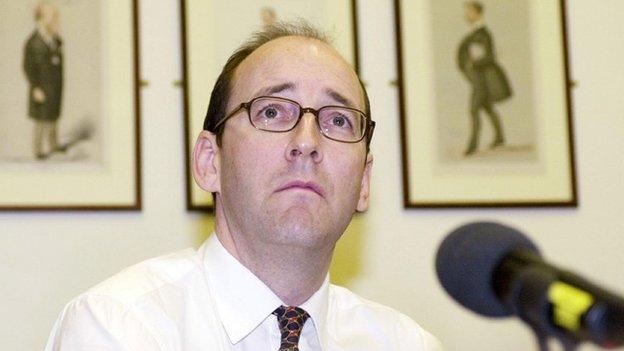City watchdog accused of 'extraordinary blunder' over inquiry into 30m policies
- Published

The FCA is concerned some savers face losing part of their savings if they move provider
The City regulator appears to have made an "extraordinary blunder" by allowing details of an insurance industry investigation to be made public early, a senior MP has said.
Commons Treasury committee chairman Andrew Tyrie said the leak may have "damaged consumer confidence".
The Financial Conduct Authority (FCA) said on Friday it would probe the sale of 30 million policies worth £150bn.
It will examine how the news leaked, hitting shares in insurance firms.
The inquiry will look at pensions, endowments, investment bonds and life assurance policies sold in the UK between the 1970s and 2000.
The FCA had been due to announce the probe in its annual business plan on Monday, but details were revealed ahead of schedule by The Daily Telegraph, external.
Otto Thoreson, director general of the Association of British Insurers, said the story had caused "absolute confusion in the investment markets".

Andrew Tyrie said releasing details of the investigation ahead of schedule may have caused damage to consumer confidence
Mr Tyrie said: "On the face of it, this is an extraordinary blunder.
"It is crucial that we have a full and transparent explanation about how such an apparently serious mistake came to be made by our financial services watchdog - the body appointed by Parliament to enforce high standards of conduct.
"The principle that market sensitive information is released accurately to all participants at the same time appears to have been breached."
'Uncertainty'
Mr Thoreson told the BBC: "What happened was effectively a pre-briefing of a business plan which is going to be published on Monday."
"But because it was to one newspaper, and it was written up as a story without the ability of those of us who are involved in the industry to corroborate issues, what you saw was the uncertainty that was created causing absolute confusion in the investment markets."
Later on Friday the FCA issued a statement in response to concerns about how it had handled the release of the news about its investigation.
"The Board will conduct an investigation into the FCA's handling of the issue involving an external law firm, and will share the outcome of this work in due course," it said.
Legal & General, Aviva and Resolution - which owns Friends Provident - were among the biggest fallers on the FTSE 100, just days after share prices were hit by George Osborne's plans for an overhaul of the UK's pension system and a cap on pension management fees.
'Zombie' funds
Formally announcing the inquiry into old policies on Friday, the FCA said it was concerned that some companies were not giving the same priority to policies sold years ago as they did to new policies.
A large number of policies sold to consumers in the 30 years to 2000 include terms that penalise those attempting to switch to a cheaper provider.
Some savers face losing up to half of their savings if they move to another company.
The FCA also said it feared "zombie" funds, which are closed to new clients, were being used by insurers to pay bills from other parts of their businesses.
Details of the inquiry will be officially published on Monday.
But concerns that will be covered include:
Fears that changes are being made to investments to benefit firms, not customers
Worries that "unfair" overheads are allocated to historic funds
Concerns that companies are failing to regularly review these policies
Issues over the communication sent by companies to policyholders
The financial services industry has been scarred by several high-profile scandals during the past few decades involving the mis-selling of policies such as mortgage endowments, personal pensions and payment protection insurance.
Millions of endowment policies were sold in the 1980s and 1990s, typically as a method of repaying mortgages, often with unsubstantiated claims that they were guaranteed to pay off the customers' home loan. Millions of pounds were subsequently paid in compensation.
- Published28 March 2014
